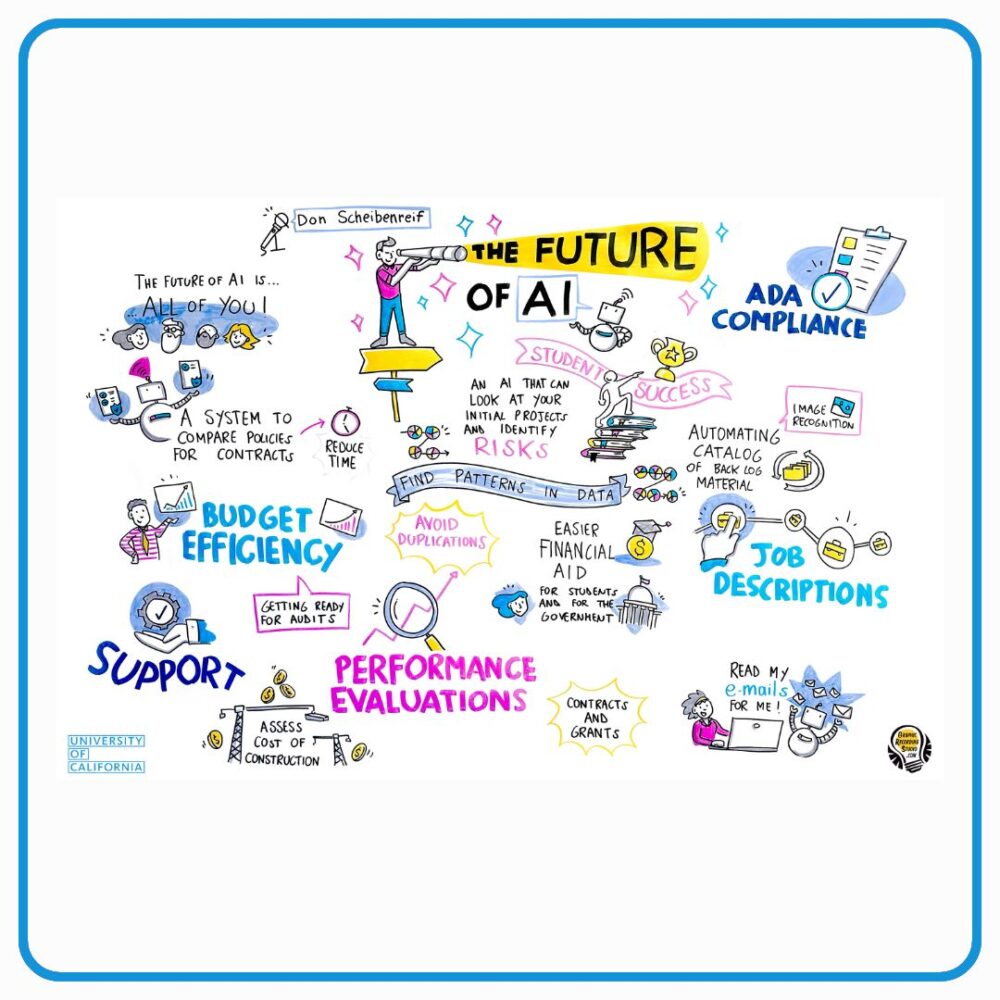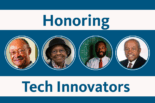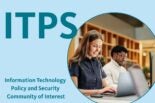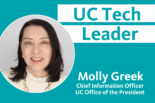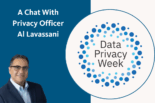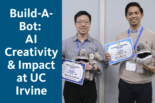During this pivotal moment in the tech industry, with rapidly expanding advances and ongoing questions about the university’s role, the UC AI Council hosted a leadership event focused on the use of AI in administration. The workshop provided leaders the opportunity to develop a common framework for how they will advance in the field going forward – balancing time to market and the availability of new tools with a range of important managerial, ethical, legal and other considerations.
Over 250 senior administrative leaders from across the University of California gathered from September 30 to October 1, 2024, to explore current and future applications of AI across administration. The workshop featured interactive presentations and breakout sessions, fostering a shared understanding of key considerations for AI implementation guided by the UC AI Principles and UC AI Risk Assessment Guide* — frameworks to ensure safe, ethical, and effective use of AI. Participants shared updates on their work, discussed priorities and challenges, explored new tools, and expanded their network to promote ongoing dialogues and knowledge exchange. This workshop provided an important opportunity for UC administrative leaders to establish a common framework that emphasizes strong management practices with UC-wide collaboration to advance their knowledge of emerging technologies. Key takeaways from the workshop are summarized below.
Workshop takeaways
- Support AI in administration – Ensure resources are allocated to advance the use of AI in administration so that the university has the opportunity to apply AI business operations, as it has successfully done in research, patient care and student education.
- Incorporate views systemwide – The ability to share ideas, systemwide, is a unique value of the UC tech community. We need to take time to capitalize on this, as we have done in this two-day workshop.
- Balance speed with rigor – It may be difficult to do everything at once – to be first to market, taking time to consider – and adjust for – all future ramifications of execution, from privacy and security to long-term costs and societal implications such as fairness and bias.
- Start with business objectives – Starting technology discussions with business objectives, clarifying the value that AI will provide, and investigating contextual factures inside and outside the organization will ensure long-term success. Gartner called this process, establishing one’s “AI ambition.”
- Refrain from leaving AI unattended – Remember to include human skills of integrity and creativity to review the conclusions drawn by the data and algorithms we feed it. During the workshop, Gartner introduced the term “human in the loop,” which some call including “domain expertise.”
Questions arose around some of the following key topics
- Job security and upskilling the workforce
- Data quality at an institution that has some of the largest data sets in the world. How to manage the cost, risk and complexity of its quality
- AI equitably across functions and other stakeholder types, including those at different levels, on different teams, and those with accessibility challenges – and servicing/funding the immediate demand by all these groups
- Environmental impact of AI – how do we manage any costs and consequences
- Privacy and security – understanding and managing the risks
- Starting with technical capabilities and experimentation (bottom up) vs starting with business problems, budgets and demonstrated ROI (top down)
- Central/ consolidated approaches vs diversified approaches across the system
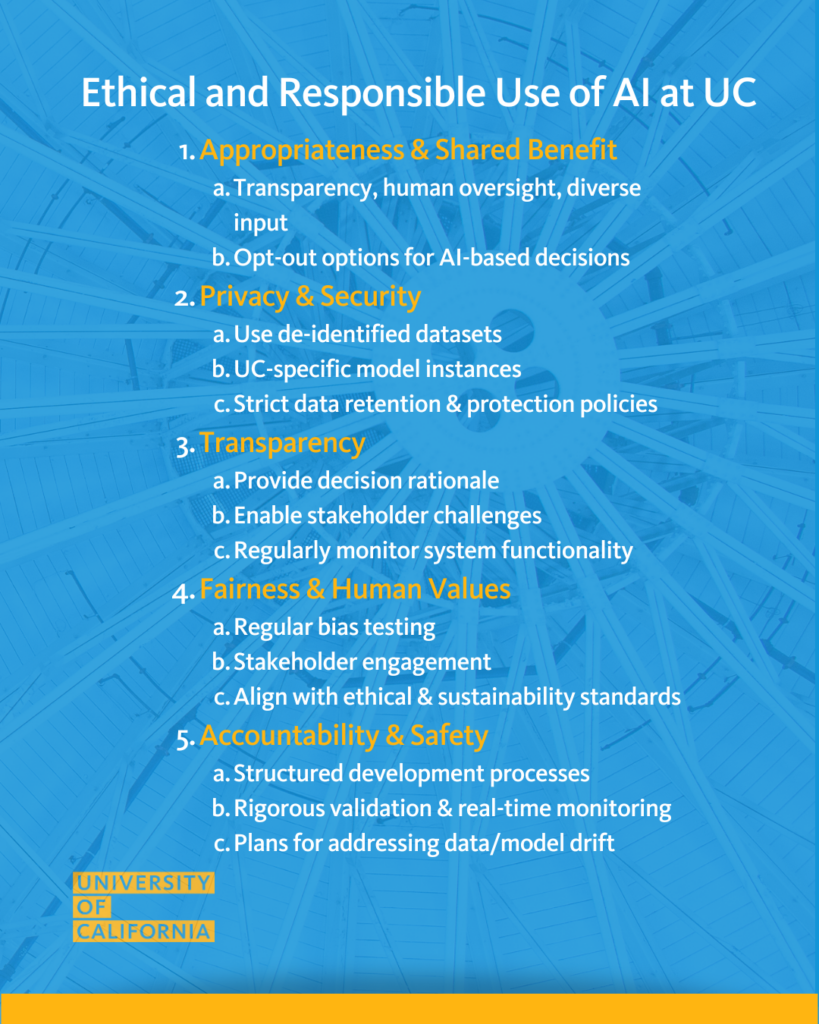
Workshop elements
The workshop programming committee created a unique agenda to maximize learning from thought-leaders and among peers, including the following elements:
- Leaders inside and outside UC provided important context: In-depth workshops on AI roadmaps, governance, and strategic deployment, tailored to address sector-specific challenges.
- Interactive on-stage discussions, breakouts supported colleague-to-colleague learning: A showcase of AI-driven projects across the UC system, where attendees could exchange ideas and explore solutions.
- A graphic designer documented the workshop real-time: The graphic recorder provided high-quality images, and thought-provoking quotes from leading voices in higher education and AI.
The sections, below, are based on the workshop agenda.
Key Insights and Themes
Part 1: Setting the stage for the interactive workshop:
Opening Remarks
Van Williams, Alexander Bustamante, with UC Office of the President, and Camille Crittenden with the CITRIS Banatao Institute
Conference leads Van Williams, Alexander Bustamante, and Camille Crittenden welcomed the participants, highlighting that AI engagement does not require technical expertise. That being said, a rigorous understanding of ethical elements, including privacy and compliance, is key to success. Camille Crittendon encouraged participants to identify three challenges AI might solve, learn about three new tools, and connect with three new colleagues.
Interactive Plenary: “We Shape AI, AI Shapes Us”
Don Scheibenreif, Gartner
During the first presentation, “Interactive Plenary: We Shape AI, AI Shapes Us,” Don Scheibenreif, Gartner, presented an overview of AI’s lifecycle, noting a decline in the “hype cycle” due to operational and societal challenges. His colleague, Svetlana Sicular, joined him to answer questions. They discussed philosophical considerations, such as human vs. machine intelligence, and emphasized that job security will not be in danger. They introduced several terms which may be adopted across the university, including “Everyday AI – typically for administrative purposes and “Game changing AI,” typically for customer-facing applications in research, student education, and research.
The infographic provides a visual snapshot of the Interactive Plenary: We Shape AI, AI Shapes Us.
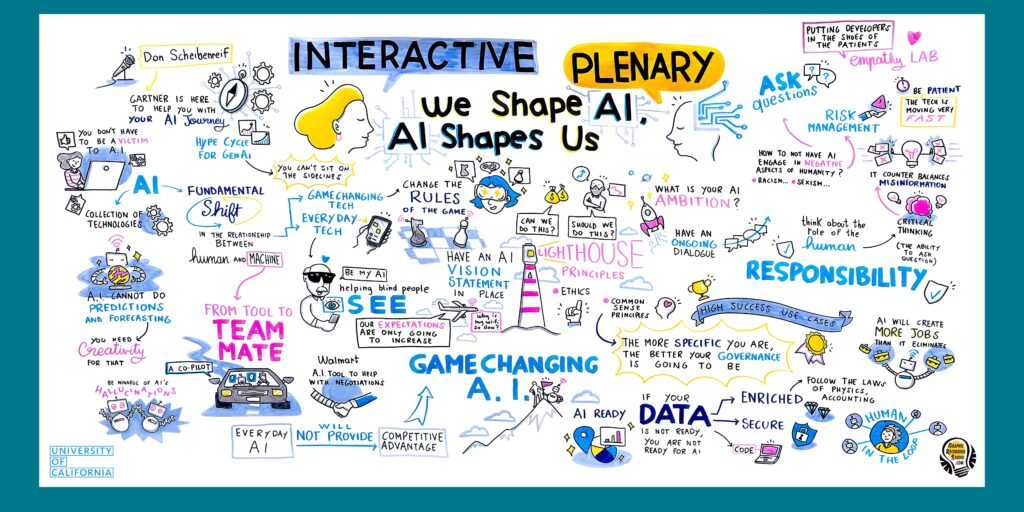
A panel of technology leaders providing UC-wide insights: “UC AI Innovation Spotlight”
The “UC AI Innovation Spotlight” featured a panel including several CIO’s and one chief data officer.
Alex Bui, UCLA, moderator, with panelists Tom Andriola, UC Irvine, Vince Kellen, UC San Diego,
Lucy Avetisyan, UCLA and Ki Lai, UCSF
Moderated by Alex Bui, five UC technology leaders, including representatives from UCLA, UC San Diego, UCSF, and UC Irvine, shared campus-specific AI advances. Vince Kellen, UC San Diego, and Tom Andriola, UC Irvine, described their custom-built AI models using campus data and secure infrastructure, and Ki Lai, UCSF, discussed the LLM solution being rolled out at UCSF called Versa. Lucy Avetisyan, UCLA noted that her campus is the first UC to contract with ChatGPT. She emphasized the need for rigorous vetting in tool adoption to manage legal and privacy risks. Ki Lai added that prioritizing protocol not only ensures security but promotes inclusion by modeling the caution that is needed to consider diverse stakeholders before implementation.
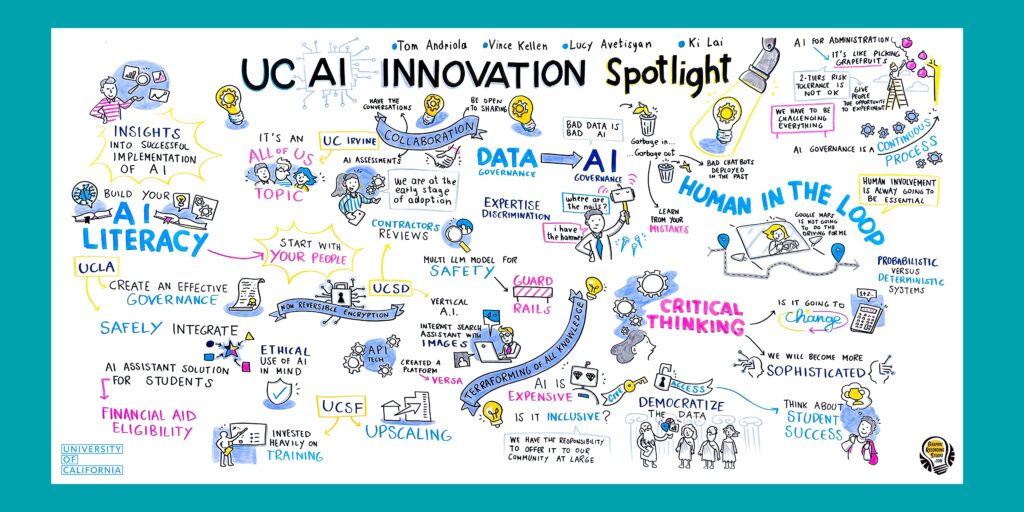
After-dinner interactive session and preparation for the morning workshop: The Future of AI
Don Scheibenreif, Gartner
Don Scheibenreif, Gartner, led participants in a discussion regarding administrative challenges AI could address, such as email overload, performance reviews, writing job descriptions and other labor-intensive tasks. They led an activity using a quadrant “radar” model to map AI adoption across administrative and customer-facing operations, prompting participants to design a custom radar for their own teams, during their breakout sessions the next day.
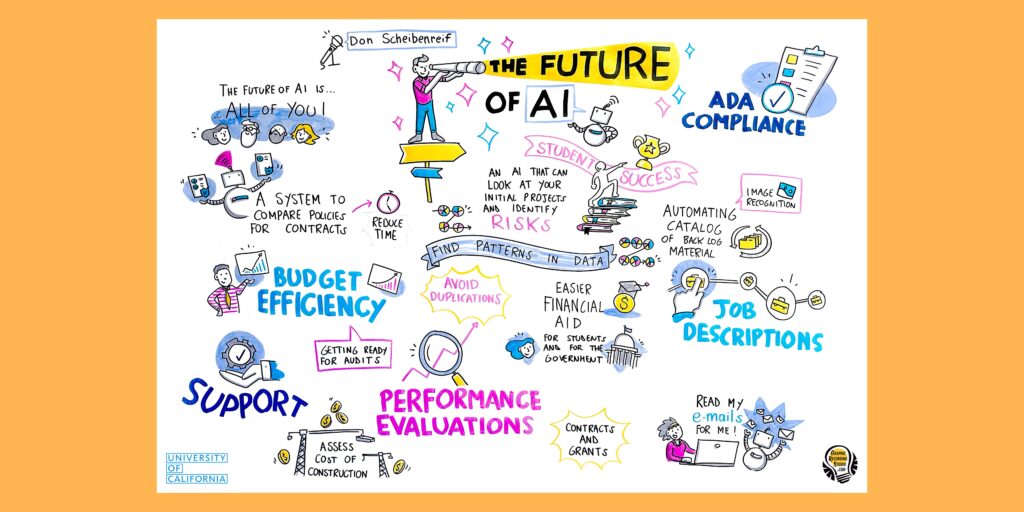
Fireside Chat with AI Leaders: AI in Higher Education Administration
Rachael Nava, UC Office of the President, moderator, with panelists Sasha Sidorkin, California State University, Sacramento, Marc Sedam, New York University
VP of Administration and Chief Operating Officer, Rachael Nava facilitated a discussion with technology leaders at New York University (NYU) and California State (CSU) university. The discussion highlighted the diverse ways institutions approach AI to optimize operations, including NYU’s $50M savings through AI-based patent tracking, and numerous thought-provoking considerations, which were new/intriguing to the audience such as the belief that privacy and security concerned were over-exaggerated, or that any institution should attempt the creation of their own GPT, given the massive capabilities of OpenAI.
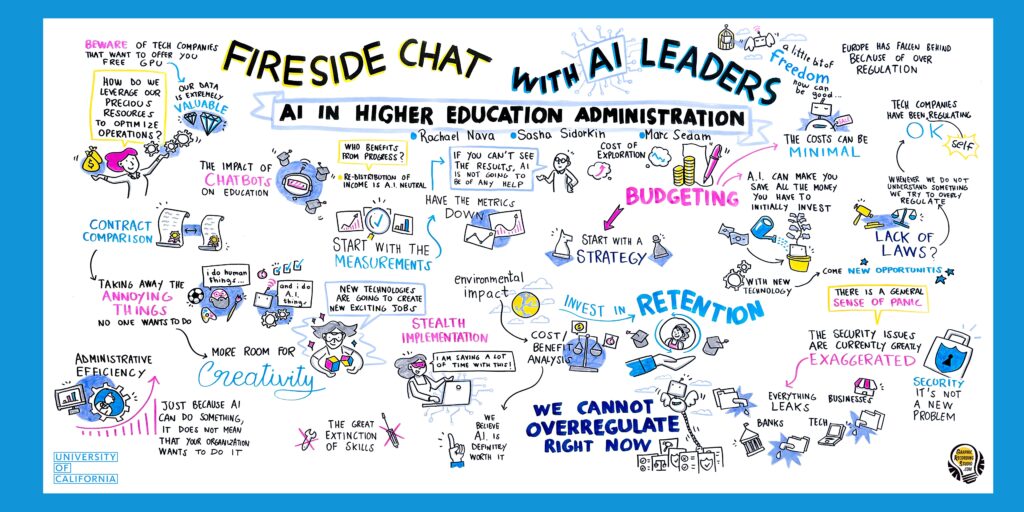
Day 2 Highlights
Workshops and Collaboration
Jenny Loftus, conference co-chair, with Van Williams and Camille Crittenden, welcomed participants to day 2, and facilitated the day’s workshops and a share fair with interactive stations. Over the course of two breakout sessions (one in the morning and one in the afternoon), participants were grouped by the principal aspect of the university mission they serve (i.e. research, education, patient care, or business operations (aka “enterprise”) and phase of maturity, from considering AI tools to rolling them out at scale. Cohorts identified and prioritized challenges AI could solve while accounting for legal, privacy, and cost considerations, among others. They had the opportunity to work with the AI principals in-depth, while learning more about their colleagues and their work in addressing AI across the university.

Business Perspective on AI by a UC Berkeley Haas professor of engineering and business administration
Keynote: “Deploying A.I. – Unlocking the Strategic Potential, Avoiding Pitfalls, and Getting the Organization Ready”
Saikat Chaudhuri, Berkeley Haas
UC Berkeley professor Saikat Chaudhuri presented on the business implications of AI, emphasizing a problem-first rather than tool-first approach. He warned against viewing AI as a standalone “strategy,” instead promoting its integration to solve specific challenges. At the same time, he advocated for strategic discussions that go beyond the administrative functions of the university and look at the business landscape as a whole. He introduced the importance of clearly articulating the value proposition and measuring progress against goals, on the one hand (top-down), while considering rapid innovation on the other (bottom-up).
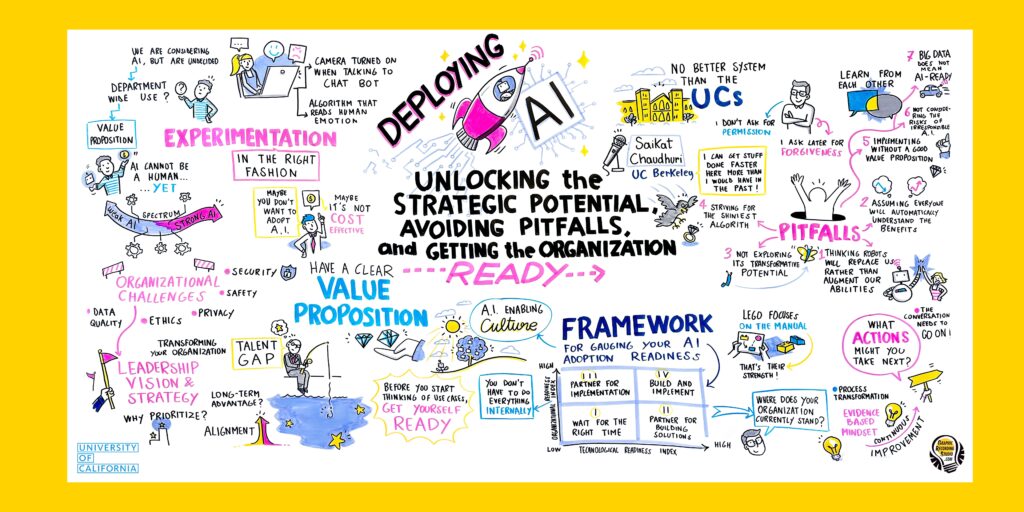
Final Panel – The value of UC-wide collaboration across team working in different arenas
Panel: “Power of 10 – Strategic Partnerships, Policy, and Direction”
Alex Bui, UC Office of the President, moderator, with panelists Cora Han, UC Health, Dennis Chornenky, UC Davis Health, Günter Waibel, California Digital Library, Simon Atkinson, UC Davis, and Chuck Haines, UC Santa Barbara
The panel title, “Power of 10,” alludes to the 10 academic campuses across the state (UC Berkley, UC Davis, UC Irvine, UCLA, UC Merced, UC Riverside, UC San Diego, UC San Francisco, UC Santa Barbara, and UC Santa Cruz.) A panel of leaders in research, patient care, and library services discussed their roles within the UC mission. Echoing earlier insights, they noted AI’s broader adoption in research (“front office” in research terms) compared to administrative functions (“back office”) and advocated for ongoing cross-UC collaboration. Expert communications will be key to successful implementation.
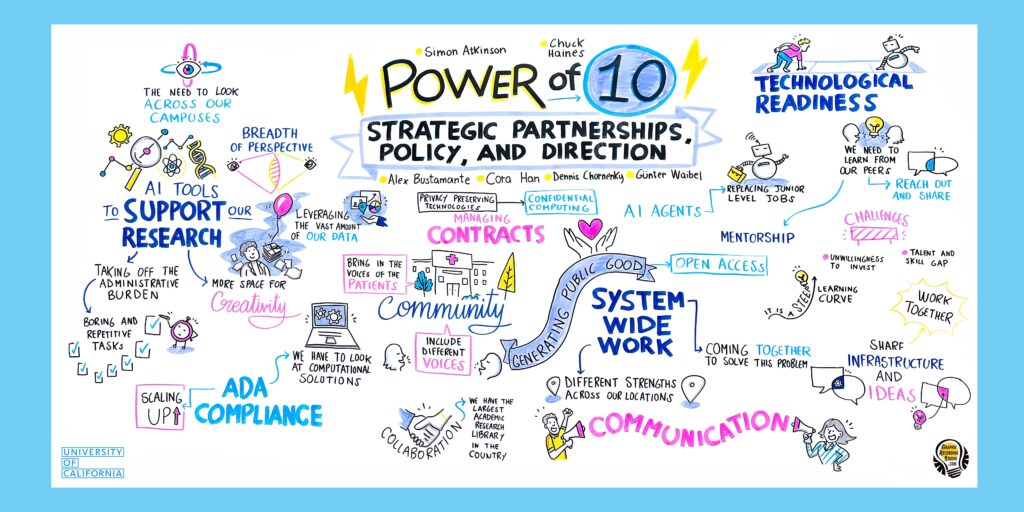
Conclusions and next steps
The conference underscored the UC system’s commitment to responsibly expanding AI use across all operational functions, from HR and marketing to finance and customer service. Leaders are now equipped to prioritize problem-solving with AI, keeping inclusion, privacy, and other elements of compliance at the forefront.
Van Williams closed the workshop, commending the rich discussion, the contributions by participants, speakers and the planning committee and conference organizers, including Kristin Cordova, chief of staff to Van Williams. He highlighted the AI Council as a valuable resource for continued collaboration, encouraging attendees to utilize the Council’s resources and expertise.
Share Fair Presenters
Accelerating Onboarding and Change Support through ThoughtExchange
Kevin Reyes
Come see how we accelerated onboarding for our new Vice Chancellor of Enrollment by gathering division-wide input in just one week, producing insights equivalent to 3-6 months of discussions. Additionally, using ThoughtExchange, we quickly identified top training needs for the rollout of the Core Competency ABCs, allowing us to address key challenges and implement solutions ahead of the performance management cycle. Complete the two exchanges for the AI in Transformations Event to see how this works in real time: 1) Expectations and Insights on Challenges and Opportunities for AI in our University Setting 2) Input from Participants on What You Are Most Excited About Connecting About.
Advancing Accessibility and ADA Compliance with Artificial Intelligence and Collaboration
Danielle Watters Westbrook, Erik Mitchell, Günter Waibel
The California Digital Library (CDL) is investigating potential opportunities to utilize artificial intelligence and machine learning (AI/ML) to enhance the accessibility of web-based content and ensure compliance with the recent revisions to Title II of the Americans with Disabilities Act (ADA). CDL seeks UC-wide partners to join us in better understanding our shared challenges and to explore if AI/ML – whether UC co-developed applications or services via third parties – might offer scalable solutions for accessibility, including assessing and remediating content.
AI-Driven Solutions for Ergonomic Risk Reduction
Stefan Tomic
The RSS (Risk Safety Solutions) AI initiative utilizes advanced vision recognition, pose detection, and wearables technology to proactively reduce ergonomic-related injuries and enhance workplace safety. By rapidly identifying unsafe postures and movements, the initiative provides immediate feedback and expert insights, transforming safety oversight and significantly improving health and cost-efficiency across the organization.
Gecko Chatbot
Sherwynn Umali
In response to the increasing demands on administrative staff, UCI’s Division of Student Affairs launched the Gecko chatbot to enhance operational efficiency and streamline communication. Initially piloted on five departmental websites, the chatbot successfully automated routine inquiries, reduced email and phone call volumes, and improved user experience, leading to plans for expanded functionality and broader adoption across the institution.
Hey Bruin: AI Personal Assistant Prototype
Anna Ahearn, Jesus Ramirez
UCLA partnered with Google to develop a groundbreaking GenAI prototype powered by Google AI tools. This innovative solution aims to improve the student experience by instantly connecting students with accurate financial aid information and resources by curating and personalizing answers to student questions.
Innovating Enrollment Management: Leveraging Emerging Technologies for Success
Darren Endo, Huma Madinawala, Jun Xiang, Tony Hwang (via VR)
In response to the challenges posed by the COVID-19 pandemic, the Office of Enrollment Management at UC Irvine embraced innovation by exploring emerging technologies to enhance productivity, collaboration, and employee well-being. By integrating virtual reality for remote work, implementing a chatbot for customer service, and piloting extended reality in student recruitment, UCI has transformed enrollment management, achieving improved efficiency and student engagement while setting a new standard for institutional practices.
Machine Learning for Enhanced Workplace Safety
Diana Cox
Risk and Safety Solution’s (RSS’s) machine learning initiatives have revolutionized operational efficiency across UC campuses by transforming injury data into actionable insights, enabling precise forecasting for injury mitigation and informed decision-making. By automating the analysis of Safety Data Sheets and enhancing data visibility, these AI-driven solutions significantly reduce the time and resources required for data management, ultimately improving safety and productivity in laboratories and workplaces.
PolicyWonk
Adam Getchell
PolicyWonk simplifies navigating UC Davis policies for everyone—whether you’re a student, faculty member, staff, or administrator. With this tool, accessing and understanding university policies is faster and more convenient than ever.
The University & AI Training Data: Authors, Libraries and the Public Good
Danielle Watters Westbrook, Erik Mitchell, Günter Waibel
AI requires high quality training data. The university generates (scholars) and stewards (libraries) vast amounts of peer-reviewed scholarly content. Positioning this content as a public good creates an open AI training corpus that turns the university from a mere consumer into an active participant, and disrupts a marketplace in which we repeatedly pay for our own content in the guise of different products.
TritonGPT
Shawn Munro
TritonGPT is a generative AI platform developed at UC San Diego to democratize access to AI by providing affordable, context-specific solutions through retrieval-augmented generation. Leveraging existing expertise and infrastructure at the San Diego Supercomputer Center, TritonGPT ensures the protection of sensitive data while making advanced AI capabilities accessible to a broader range of organizations and individuals.
UC Tech News
Laurel Skurko
UC Tech News connects those working closely with university technologies. Top topics include AI, privacy, cyber security, digital accessibility and user experience, along with unique people from diverse backgrounds, and how each of these considerations form organizational opportunities. It is created by the UC Tech community, with 11,000 tech employees across 30+ UC entities, and is published weekly by the UC Office of the President.
Versa
Joseph Owens, Victor Galvez
In response to the risks posed by AI, UCSF developed Versa, a secure AI platform that transforms clinical care, research, education, and administration while safeguarding sensitive information. Created by a multidisciplinary team, Versa improves workflow automation, enhances data interaction, and supports over 4,300 users, driving innovation and operational efficiency across UCSF.
ZotGPT
Max Garrick, Sarkis Daglian
ZotGPT is UC Irvine’s campus-wide AI solution designed to enhance teaching, administration, and research by providing secure, cost-effective access to generative AI. Leveraging a collaborative effort and built on Azure OpenAI and AWS infrastructure, ZotGPT improves efficiency through tools like ClassChat, a virtual tutor, and API integrations that empower researchers and administrators.
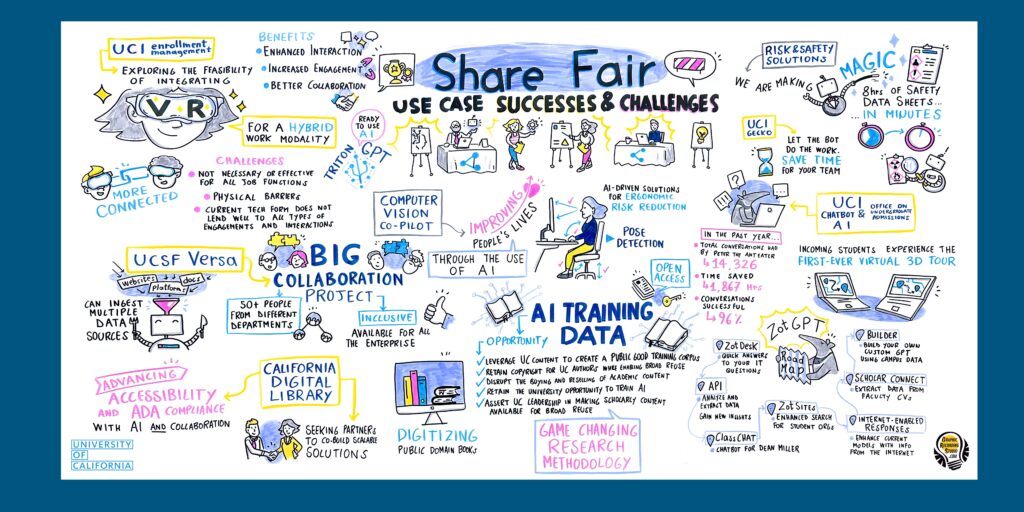
Event Program Committee
Tom Andriola
Lucy Avetisyan
Alex Bui
Alex Bustamante
Dennis Chornenky
Kristin Cordova
Camille Crittenden
Marc Fisher
Chuck Haines
Cora Han
Mike Kennedy
Ki Lai
Jenny Lofthus
Brett Pollack
Erich van Rijn
Guenter Waibel
Paul Williams
Van Williams
Gillian Wilson
Eugene Whitlock
Darnele Wright
Related reading
September 30, 2024, NEWS: Summary Report – UC AI Congress, UC Tech News
September 1, 2024, EVENT: UC AI Workshop, September 30 – October 1, 2024 – LEARN MORE, UC Tech News
Contact

Kristin Cordova
Chief of Staff
UC Office of the President
Kristin.Cordova@UCOP.edu
Event programming committee
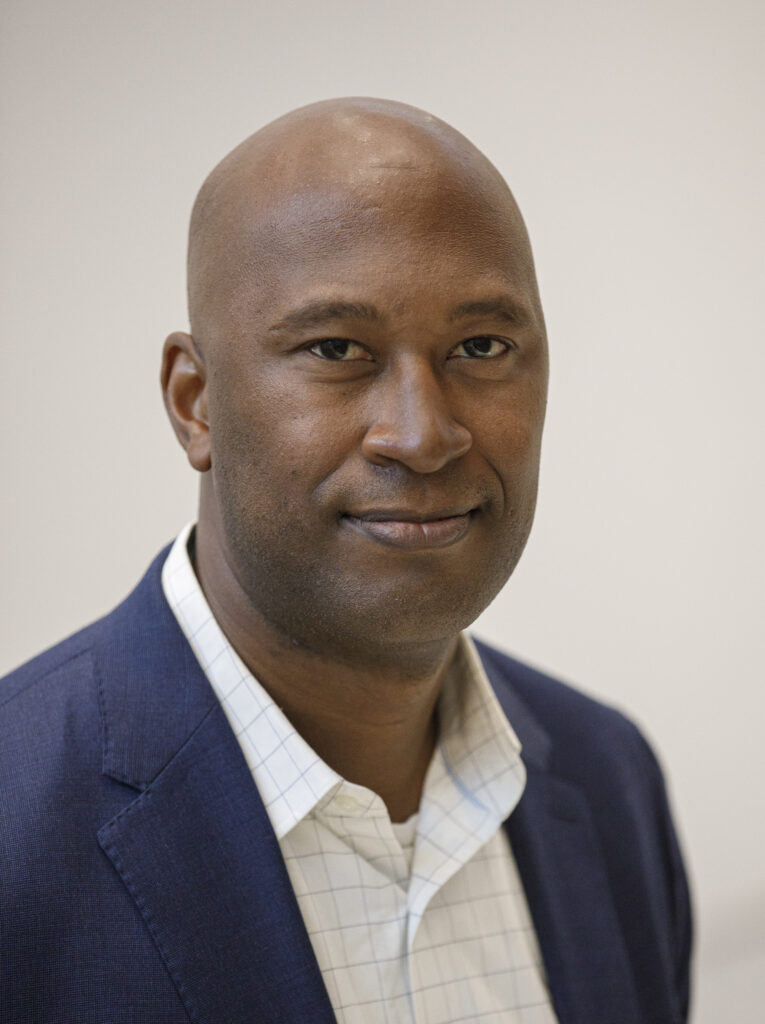
Van Williams
VP Information Technology and Chief Information Officer University of California

Camille Crittenden, Ph.D.
Executive director of CITRIS and the Banatao Institute, and co-founder of the CITRIS Policy Lab and EDGE (Expanding Diversity and Gender Equity at the University of California)
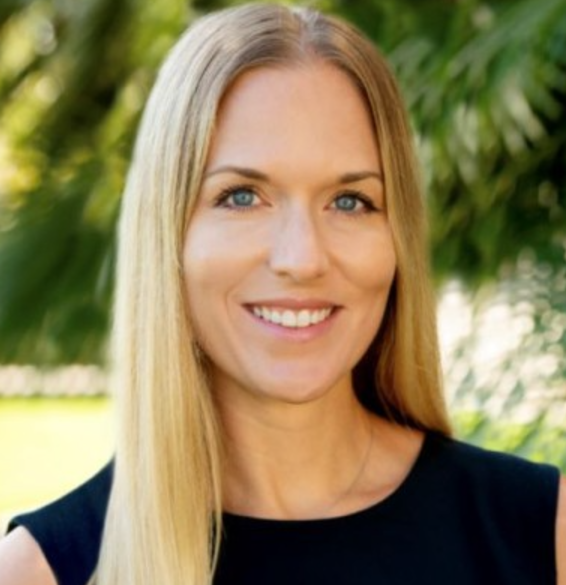
Jenny Lofthus
General Compliance Manager, Ethics, Compliance and Audit Services, UC Office of the President
AI Council Sponsors
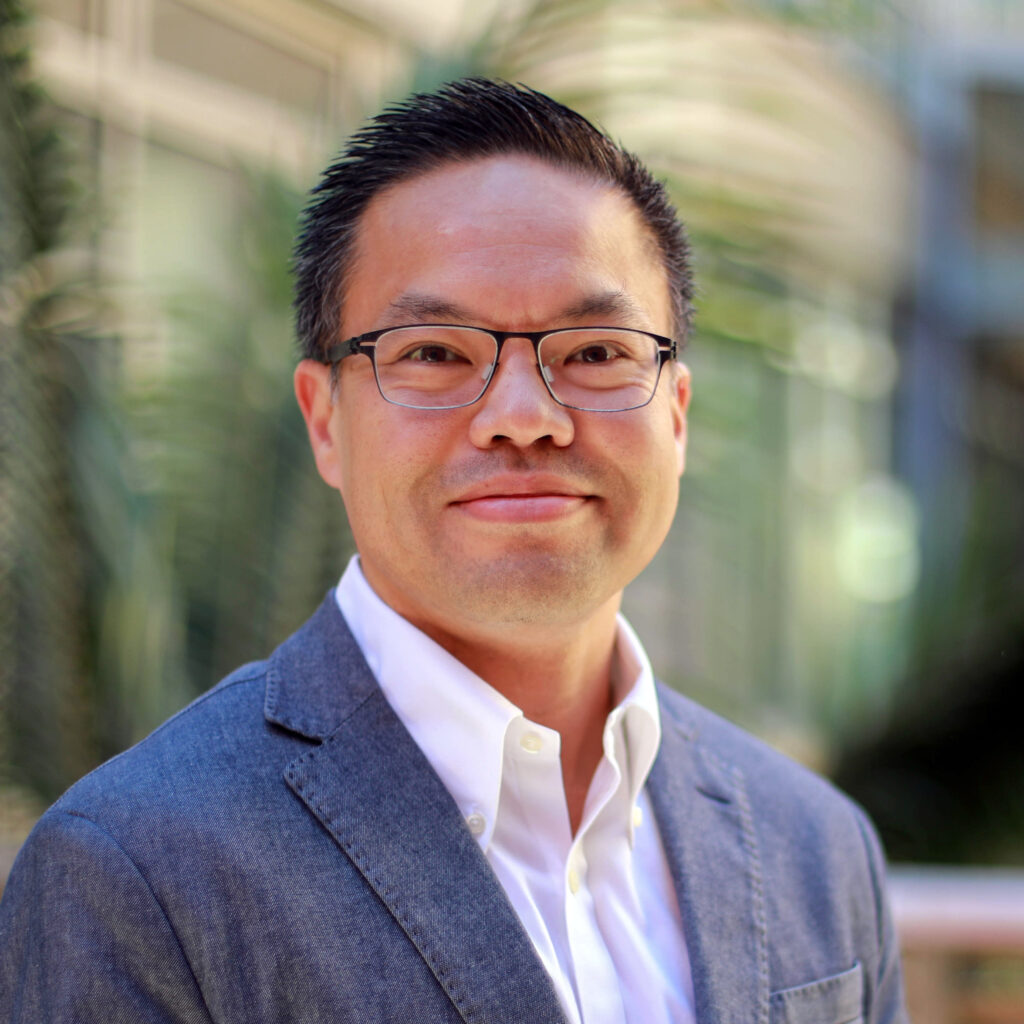
Director, Medical & Imaging Informatics Group; Director, Medical Informatics Home Area;
Professor, Departments of Radiological Sciences, Bioengineering & Bioinformatics;
David Geffen Chair in Informatics

Senior Vice President and Chief Compliance and Audit Officer for the University of California system

